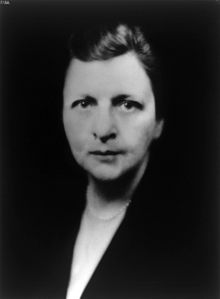Frances C. Perkins
| Frances Perkins | |
|---|---|
 |
|
| 4th United States Secretary of Labor | |
|
In office March 4, 1933 – June 30, 1945 |
|
| President |
Franklin Roosevelt Harry Truman |
| Preceded by | William Doak |
| Succeeded by | Lewis Schwellenbach |
| Personal details | |
| Born |
Fannie Coralie Perkins April 10, 1880 Boston, Massachusetts, U.S. |
| Died | May 14, 1965 (aged 85) New York City, New York, U.S. |
| Political party | Democratic |
| Spouse(s) | Paul Wilson |
| Education |
Mount Holyoke College (BS) Columbia University (MA) University of Pennsylvania |
Frances Perkins (born Fannie Coralie Perkins; April 10, 1880 – May 14, 1965) was an American sociologist and workers-rights advocate who served as the U.S. Secretary of Labor from 1933 to 1945, the longest serving in that position, and the first woman appointed to the U.S. Cabinet. As a loyal supporter of her friend, Franklin D. Roosevelt, she helped pull the labor movement into the New Deal coalition. She and Interior Secretary Harold L. Ickes were the only original members of the Roosevelt cabinet to remain in office for his entire presidency.
During her term as Secretary of Labor, Perkins executed many aspects of the New Deal, including the Civilian Conservation Corps, the Public Works Administration and its successor the Federal Works Agency, and the labor portion of the National Industrial Recovery Act. With the Social Security Act she established unemployment benefits, pensions for the many uncovered elderly Americans, and welfare for the poorest Americans. She pushed to reduce workplace accidents and helped craft laws against child labor. Through the Fair Labor Standards Act, she established the first minimum wage and overtime laws for American workers, and defined the standard forty-hour work week. She formed governmental policy for working with labor unions and helped to alleviate strikes by way of the United States Conciliation Service. Perkins dealt with many labor questions during World War II, when skilled manpower was vital and women were moving into formerly male jobs.
...
Wikipedia
